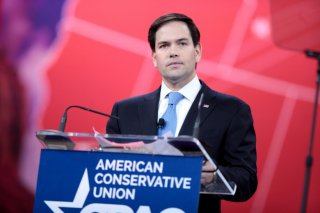Can Marco Rubio Win the GOP Nomination?
Senator Rubio seems to be positioning himself for some serious political oomph should the non-politician politicians falter. Can he win?
Let’s stipulate that these early polls aren’t necessarily all that meaningful in gauging who is going to emerge as the Republican presidential nominee next year. But they do offer some sustenance for thoughtful analysis. Much has been made of the fact—and it is significant—that the three frontrunners aren’t politicians, and only one of them has ever run for office. Together, Donald Trump, Ben Carson and Carly Fiorina pull around 50 percent of the electorate, based on these polls (49 percent in the latest USA Today/Suffolk poll; 51.4 percent in the Real Clear Politics composite ranking). That says something about the state of American politics heading into the election year—about which, more below.
But let’s look now at the politician who has emerged, in both polls, in the number four slot—Marco Rubio.
True, he registers only at 9 percent (USAT-Suffolk) or 9.5 percent (RCP), but that is a shade above his mentor, Jeb Bush, whose political record is far more extensive than Rubio’s. If there is significance in the Florida senator’s poll standing today, it must be assessed in the context of those three non-politician front-runners. Two questions: What do the survey respondents see in this young man that they like? And what is he saying that has allowed him to edge out Bush and pull away from the rest of the field, excepting the top three?
On the first question, it seems straightforward. This young man is a natural politician. He speaks in measured tones but with strong conviction, and he projects an impressive ability to articulate his positions in clear, concise, and sometimes eloquent prose. David Brooks of the New York Times describes him as “a genius at relating policy depth in a way that is personal.”
He’s young (just forty-four) and fresh-faced but clearly well grounded on both domestic and global matters. On domestic issues he has positioned himself in precise alignment with his party. And, while those of us whose foreign policy realism stirs shudders at the interventionist zeal of politicians such as Rubio, he is in the Republican wheelhouse there as well. All of that would quite naturally stir Republican survey respondents to signal an interest in giving him a thorough look.
But Rubio is not just chasing after the non-politicians in the polls. He also seems to be chasing after them in rhetoric.
What Trump, Carson and Fiorina signify is that the electorate, and particularly the GOP electorate, believes the country is a mess and that its governmental class in Washington and societal elites across the country are the culprits. This agitated electorate might end up with a traditional politician at the helm of the party, but they don’t really want to. They see a crumbling status quo and then hear their politicians talking as if they don’t see anything wrong in their playing the same old games in the same old way. They’re on to the reality that establishment politicians are always the last to abandon a sagging status quo.
It’s possible that one of the non-politician candidates will turn out to be just the ticket for the party. But perhaps not. Perhaps Trump ultimately will be seen as too wild and out of control; Carson as too mild-mannered and wispy; Fiorina as too slick-tongued and self-absorbed. In that event, Republicans may turn to the man who is speaking as if he understands better than most what’s going in the country.
When he was asked about the announced retirement of House Speaker John Boehner, Rubio carefully separated himself from his party’s anti-Boehner segment by saying, “I’m not here today to bash anyone.” But then he added, “But the time has come to turn the page and allow a new generation of leadership in this country.” In one sense, this was merely reminiscent of John Kennedy’s call in 1960 to “get the country moving again” with a new generation of men who had actually gone to battle in World War II and were now prepared, in their forties, to assume the nation’s mantle of leadership.
But in a larger sense he was fashioning his rhetoric to fit the feeling within the party that the old leadership has lost its way and needs to be replaced.
“These issues are so generational,” said Rubio, “that people cannot help but ask, how can it be…that we sent a Republican majority to Congress and yet they’re still not able to stop our country from sliding in the wrong direction?” Very clever use of the phrase, “wrong direction,” an allusion to the poll results showing that vast numbers of American believe that the country is on the wrong track. And, like the American people, he’s not letting his fellow Republicans off the hook for a significant share of the blame.
Rubio attacks the “political class” for clinging to “outmoded ways of thinking.” Nothing will improve, he adds, “if we keep promoting the same people to higher and higher ranks within our government.”
Thus, it isn’t just a generational thing with Rubio. It’s a generational thing tied to a call for a new direction for the country, a split from the past entrenchment of both parties and a new political alignment that can break the country’s current crisis of deadlock and set it upon a new path.
It isn’t clear if Rubio can craft and promote the policy prescriptions needed to give meaning and credence to this call for a break with the past of both parties. And, whether he does or not, the polls won’t tell us whether he is succeeding. Only the voters can do that. But, in the meantime, Rubio seems to be positioning himself for some serious political oomph should the non-politician politicians falter.
Robert W. Merry is a contributing editor at The National Interest and an author of books on American history and foreign policy.
Image: Flickr/Gage Skidmore

